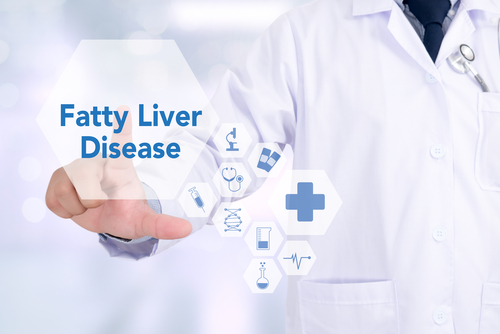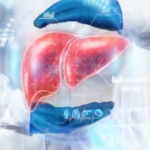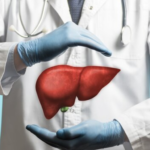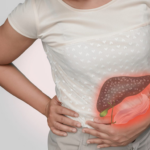
The result of the excess fat in liver cells wherein fatty tissue slowly builds up in the liver when a person’s diet surpasses the amount of fat his or her body can handle. A person is considered to have a fatty liver when more than 5% of their liver is made up of fat. Fatty liver is a reversible condition that can be resolved with changed behaviors. It often has no symptoms and generally does not cause permanent damage. The liver is the 2nd largest organ in the body and its function is to process what we consume and filter out any and all harmful substances in our blood. This process, however, is interrupted when excess fat is in the liver. Generally, the liver self-repairs by rebuilding new liver cells when the old ones are damaged. When there’s continuous damage to the liver, permanent scarring can take place, leading to what is called cirrhosis.
There are two main types of fatty liver disease:
Alcoholic liver disease (ALD)
Nonalcoholic fatty liver disease (NAFLD)
Alcoholic Liver Disease (ALD) – This disease is primarily contracted from drinking excessive amounts of alcohol. Genes that are passed down hereditarily can also play a role in ALD. They also have an impact on the way your body breaks down the alcohol you drink. Other factors that may affect your chance of getting ALD are –
Hepatitis C
Having too much iron content in your body
Being overweight
Nonalcoholic Fatty Liver Disease (NAFLD) – The causes of NAFLD are largely unknown. It generally tends to be hereditary and is more prone to the middle-aged, overweight, or obese and tend to have high cholesterol and diabetes too. Other causes for NAFLD are:
Medications
Viral hepatitis
Autoimmune or inherited liver disease
Fast weight loss
Malnutrition
Causes Of Fatty Liver
Obesity
Hyperlipidemia, or high levels of fats in the blood
Diabetes
Genetic inheritance
Rapid weight loss
A side effect of certain medications, including aspirin, steroids, tamoxifen, and tetracycline
Symptoms Of A Fatty Liver
You may experience fatigue
Vague abdominal discomfort might be experienced.
Your liver may become slightly enlarged,
Excess fat can cause liver inflammation.
You may have a poor appetite
You might incur some weight loss
Chances of abdominal pain
You might feel weak and confused
Gastrointestinal (GI) bleeding
Mental changes (encephalopathy)
Accumulation of fluid (ascites, edema)
Treatment For Fatty Liver
There isn’t a medication or surgery to treat fatty liver. However, these are some of the options your doctor might recommend.
Limiting or avoiding alcoholic beverages
Managing your cholesterol
Losing weight
Controlling your blood sugar
Fatty liver disease can also be reduced by eliminating fatty foods and foods high in sugar from your diet. Consume healthier foods like fresh fruits, vegetables, and whole grains. Replace red meats with lean animal proteins like chicken and fish.
A. What is fatty liver disease and what are the risk factors?
Fatty liver is an accumulation of fat in the liver which can cause damage to the liver cells and may progress gradually to liver failure. Fatty liver disease or non-alcoholic fatty liver disease (NAFLD) is a spectrum of a wide range of liver diseases. Overweight or obese people, diabetic patients have more risk of having a fatty liver.
B. How fatty liver disease occurs and how to know if you have this?
NAFLD is a result of abnormal metabolism and excess calories and fat absorbed from food, transported to the liver, and ultimately stored in the liver as fat.
There are no symptoms for NAFLD, so-called a silent disease. It is usually identified incidentally on ultrasonography or fibroscan.
C. What are the grades and consequences of fatty liver disease?
Fatty liver is graded as grade I, II, or III depending on subjective assessment of fat accumulation in the liver. If you have fat but no inflammation or tissue damage, the diagnosis is NAFLD.
If fat leads to inflammation and liver damage, the diagnosis is non-alcoholic steatohepatitis (NASH).
Further, it can progress to fibrosis in the liver called fibrosis and irreversible liver damage called cirrhosis which can lead to Liver Cancer.
D. What to do if you have a fatty liver?
If someone is on routine screening or incidentally detected to have fatty liver, he should not panic as it is very slowly progressive and usually preventable & treatable disease. Ultrasonography and fibroscan of the liver along with a few blood tests are done for detailed evaluation by a liver specialist. Self and inappropriate medication can further damage the liver.
E. Is fatty liver life-threatening and what are the implications of this disease?
Fortunately, NAFLD can be detected easily and can be treated but progression to cirrhosis and liver cancers can be life-threatening. NAFLD is an important risk factor for heart-related disease; many patients with it may die from heart failure before they have liver failure.
F. Can fatty liver be reversed?
Yes, it can be reversed if detected and treated at an early stage. If you have NASH, no medication is available to reverse the fat deposition in your liver. A healthy diet, increasing physical activity, and medications can improve fatty liver and decrease the progression of advanced Liver Disease.
G. How to prevent and treat fatty liver disease?
Weight optimization in a controlled and safe manner
Diet modification: Reduce calories intake by 15-20%, reduce carbohydrates like sugars & starch, and avoid fats, soft drinks, fast foods, and heavy meals
Eat a healthy balanced diet with more fruits and vegetables
Avoid alcohol
Check diabetes and get proper treatment
Increase physical activity, walking, exercise as advised by a doctor
Regular check-ups by a liver specialist
Specific medications to improve fatty liver and liver damage
Dr. Prasad Bhate – Liver Specialist in Pune
Dr. Prasad Bhate is a liver specialist in Pune and has experience of 10 years in this area. He’s an advisor at Aditya Birla Memorial Hospital in Pimpri-Chinchwad, Pune. Additionally, He’s experienced in Liver transplant Surgical procedures and Hepatology treatment. He accomplished DM – Gastroenterology from Lokmanya Tilak Municipal Medical Faculty, Sion, Mumbai in 2015 and MBBS from Maharashtra College of Wellbeing Sciences, Nashik in 2005. He’s a Liver specialist at main company hospitals in Pune. He’s labored for superior therapeutic endoscopic interventions like ERCP, CBD-stenting, esophageal stenting, pancreatic stenting, and so on. Dr. Bhate successfully removed the Doc Extract Battery from a 9-month-old baby at Pune.




